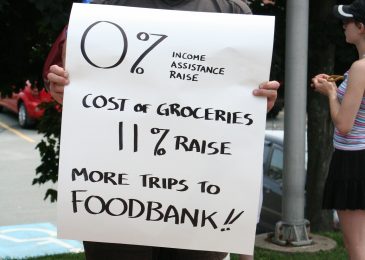KJIPUKTUK (Halifax) – Six poverty advocates appeared before the Community Services Standing Committee earlier this month to talk about special needs allowances for people on social assistance.

The program in its current state is a mess, the representatives of six different organizations told the MLAs who make up the standing committee. The department is becoming increasingly tightfisted, processes are not practical and rules are created by civil servants without democratic oversight.
“There appears to have been ongoing directives to staff to cut costs by denying or reducing special needs allowances,” said Stella Lord, coordinator of the Community Society to End Poverty in Nova Scotia, who argued that this trend started as early as 2011 when the NDP was in power.
People who were initially granted special needs assistance are having it taken away, Lord said. In the case of transportation, for example, recipients are no longer eligible for assistance unless they have 12 medical appointments a month.
“What are the impacts this policy is having on the health care system?,” Lord asked. “Does anybody bother to find out? What message does it send to people on income assistance about social inclusion which the Department of Community Services claims to hold as a goal?”
Kellie McLeod, a social worker at Adsum for Women and Children, talked about the isolation and stress experienced by single women with disabilities and women with children in particular, as they try to navigate the current system.
It is unrealistic to expect women – many of whom have medical conditions and physical health issues – to walk six kilometers or more to and from their home to the grocery store, but that is what some of our clients are expected to do. Kellie McLeod, Adsum for Women and Children
“The women I work with need a transportation allowance to complete basic tasks of daily living such as grocery shopping, banking, and attending medical appointments. It is unrealistic to expect women – many of whom have medical conditions and physical health issues – to walk six kilometers or more to and from their home to the grocery store, but that is what some of our clients are expected to do,” McLeod charged.
Megan MacBride, social worker at the North End Community Health Centre, talked about the endless bureaucratic hoops her clients are expected to jump through.
She highlighted the requirement to demonstrate the need for a telephone that does not include access to a telephone to call for help in the case of emergencies or to book medical appointments.
“This policy leaves no room for care providers to advocate for the very real risk of danger befalling a client without a telephone and is extremely unclear in what circumstance a phone would be granted as a special need,” said MacBride.
Kendall Worth, co-chair of the Benefits Reform Action Group, talked about the hardships he experienced when his special diet allowance was reduced.
“Without the ESIA client receiving that extra special needs funding, the client ends up with no choice but to live their day-to-day life with frustration and anxiety,” said Worth. “The loss of special needs allowance has affected the ESIA client’s ability to live an acceptable quality of life. It also makes their health deteriorate.”
Worth also complained about Community Services workers questioning doctors’ medical opinions.
“Department of Community Services staff have to understand that time and expense are not included in a doctor’s schedule to be further questioned by caseworkers on this issue. The fact that caseworkers are doing this is a burden on the health care system,” said Worth.
Special diet rates have not increased since 1997, despite the reality that the cost of food has risen substantially in the last 20 years. Storm Paradise, ACORN Nova Scotia
Storm Paradise, speaking on behalf of ACORN Nova Scotia, reminded members of the standing committee that the amount of funding provided for special diet recipients does not reflect the true cost of food.
Even when ESIA recipients do receive funding for medically necessary special diets, the amount they are provided with is often not enough to actually buy the food that is necessary to maintain reasonable health. Special diet rates have not increased since 1997, despite the reality that the cost of food has risen substantially in the last 20 years, said Paradise.
There is no oversight over the policy changes that happen without any input from the public, without any oversight from the Income Assistance Appeal Board, without any input from the electorate. Fiona Traynor, Dalhousie Legal Aid.
Fiona Traynor, a community legal worker a Dalhousie Legal Aid, reiterated many of the concerns expressed by other speakers.
Traynor highlighted changes in regulations and policy manuals that allowed the current harsh regime to take hold.
For instance, in 2011 the ability for a caseworker supervisor to approve a special need deemed essential although not listed in the policy manual was removed. Further changes made in 2013 did not address the issue, she said.
“Before the removal casework supervisors had some kind of discretion around alleviating the pain and suffering of applicants. We can’t forget that the core purpose of the program is to assist people who are in need. People are at the centre of this program,” said Traynor.
Traynor talked about one such case, a client suffering from environmental illness, who is ineligible for increased shelter allowance simply because that circumstance is not covered in the policy manual.
Traynor also took issue with the lack of democratic oversight when it comes to departmental policies.
“Policy is in the discretion of the bureaucrats and can be changed and is changed regularly. There is no oversight over the policy changes that happen without any input from the public, without any oversight from the Income Assistance Appeal Board, without any input from the electorate of this province,” said Traynor.
Click here for a full transcript of the June 7th Community Services standing committee meeting.



